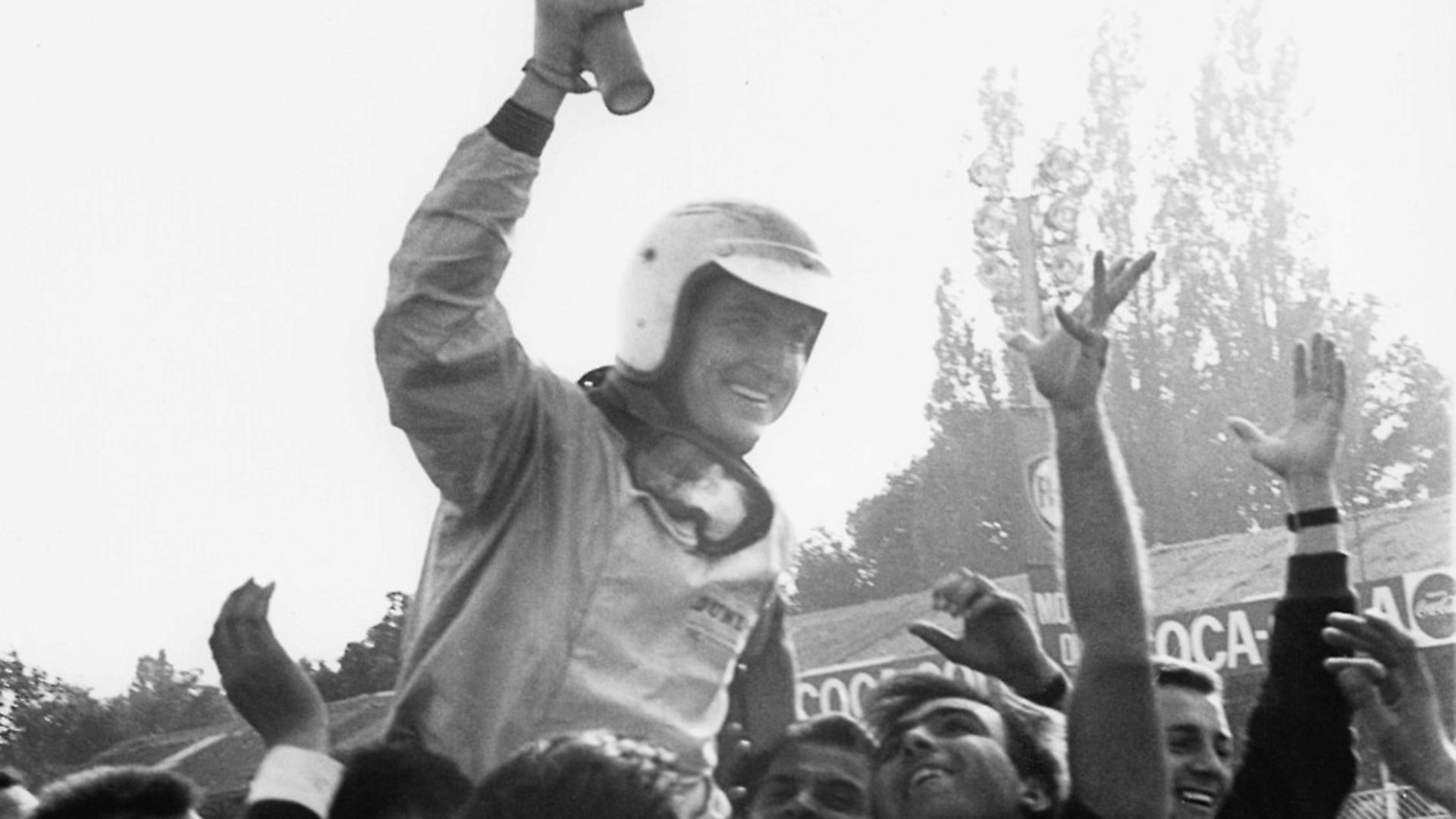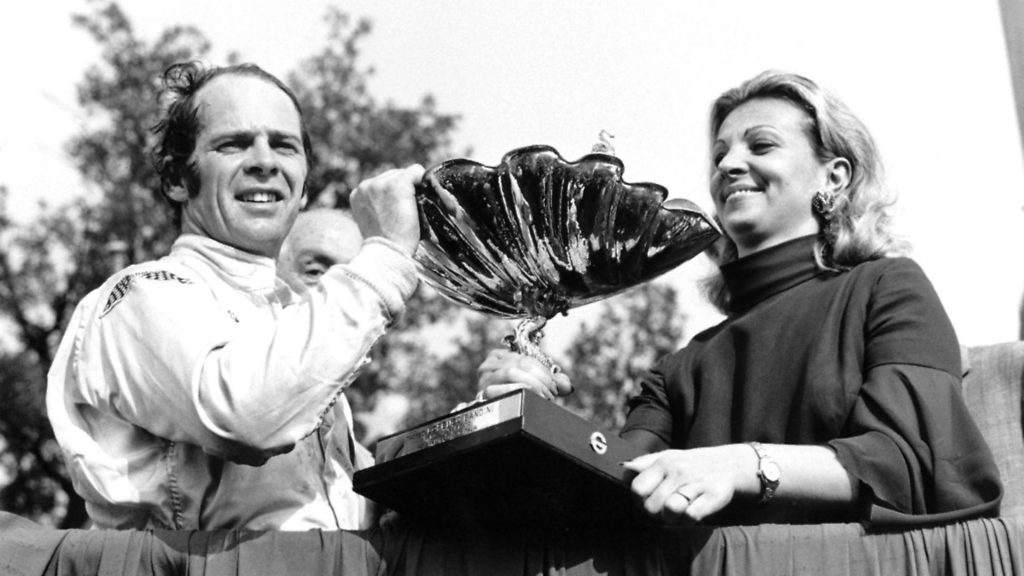
Ahead of the new F1 season, MICK O’HARE looks at the extraordinary stories of the drivers who – whether through luck, misfortune or tragedy – managed just one victory each.

It may be an apocryphal story, but it’s worth repeating anyway. Formula 1 journeyman Vittorio Brambilla is said to have been so excited about winning the 1975 Austrian Grand Prix that he crashed as he took the chequered flag. Certainly photographs show the front of the Italian’s March 751 car had been significantly rearranged as he drove his lap of honour. But his excitement was understandable, and he had just unknowingly joined an elusive and exclusive club: drivers who have won just one Grand Prix.
There have been 997 Grands Prix since the championship began in 1950 (the 1000th is in China in April) and around 800 drivers have started races. But only 23 of these have won just a single race, or only three drivers per decade. It sounds extraordinary – especially when you learn that just seven of these have come in the last 40 years. And there have even been more world champions than one-off race winners – 33 in total. But dig a little deeper and this small number starts to make more sense. Only the best drivers win races, and quickly go on to win more – as 75 have done – especially as they get signed by top teams building the best cars.
Their less-skilled counterparts never win, leaving a small coterie of drivers who for whatever reason – luck, misfortune, sometimes tragedy – have won only a single race. Hence both exclusive and elusive. Most drivers enter the club then leave almost immediately. The most recent recruit was Valtteri Bottas, the Finn who drives for Mercedes. He won the Russian Grand Prix in April 2017 and 10 weeks later won in Austria – a member for just 70 days. Most drivers who join have no expectation they won’t be leaving (although Brambilla’s reaction suggests he knew only too well).
And most, unsurprisingly, are not particularly famous, although many have fascinating stories. If the Brambilla spiel isn’t true, it should be. The Italian was nicknamed ‘the Monza Gorilla’, because of his aggressive, sometimes uncontrolled driving style and overt machismo, famous for his crushing handshake. These are not necessarily vital qualities when you’re amid 25 other cars at the start of a Grand Prix, so it is perhaps unsurprising he won only one race. And even that was shortened because of heavy rain, meaning he only picked up half the championship points awarded.
Another driver who would only pick up half points for his sole victory was Italian Luigi Musso. In the early days of the championship, drivers could switch cars mid-race. The vehicle of a lesser driver could be commandeered by his team’s star performer if the latter’s expired.
It happened to Musso during the 1956 Argentinian Grand Prix. He had to bequeath his car to home favourite and world champion Juan Manuel Fangio after 29 laps. Fangio went on to win and so Musso is the only driver on the list who, implausibly, won half a Grand Prix.
There are, of course, some drivers who won only one race because they were no longer around to win a second – Musso was one such. Two years later, he died after crashing at the French Grand Prix.
More than a fifth of the 23 on our list died racing. Former world champion Jackie Stewart is fond of saying that in his era a driver had a one in three chance of dying during his career. The toll weighed heavily on Stewart and ultimately precipitated his retirement.
Two drivers in the single victory club, Lorenzo Bandini and François Cevert were regarded as potential champions. They never got the opportunity to fulfil expectations. Italian Bandini’s death at Monaco in 1967 was particularly grim and prompted changes at circuits after straw bales intended to cushion the impact of crashes ignited when he lost control of his Ferrari at the harbourside chicane.
Like Brambilla, Bandini won the Austrian Grand Prix (in 1964) and there was irony surrounding his death. The year before he had advised director John Frankenheimer on his seminal motor racing movie Grand Prix. Bandini suggested the Monaco chicane as the scene for an accident in the film’s opening sequences.
Frenchman Cevert was Jackie Stewart’s team-mate at Tyrrell and the Scot still speaks emotionally of his friend. At Watkins Glen in the US, Stewart was about to take part in his 100th Grand Prix before retiring from racing after already securing the 1973 World Championship. He never raced, quitting on the spot after Cevert was killed instantly in practice when he struck crash barriers so hard they were uprooted. Distressing footage of the aghast reaction in the pits shows the regard in which the Frenchman was held. If there’s any positive surrounding the tragedy it’s that Cevert – whose sole win had cruelly come at the same track in 1971 – was the last driver on our list to die racing.
There are, fortunately, more uplifting stories. Luigi Fagioli, who won the 1951 French Grand Prix in an Alfa Romeo, had competed since the start of the World Championship and the race at Reims was to be his last. There wasn’t a driver in the paddock who resented him taking victory at his final opportunity. In taking the chequered flag Fagioli became – and more surprisingly remains – the oldest ever winner of any Grand Prix, at 53 years and 22 days.
Another record was also set by one of our one-time victors in a race now part of Formula 1 legend. Briton Peter Gethin’s win in the Italian Grand Prix at Monza in 1971 was then the fastest Formula 1 race in history and remains the closest-ever finish. Gethin, in a BRM, beat Swede Ronnie Peterson by 0.01 of a second with the first five finishers covered by 0.61. Monza was known for fast straights and sweeping curves before being emasculated by today’s chicanes. Races became slipstreaming battles with gaggles of cars constantly overtaking each other, then being retaken on the next lap.
As Gethin, Peterson, Mike Hailwood, Howden Ganley and François Cevert entered Parabolica, the very last corner, it was anybody’s race. Victory came down to who could get the best run to the line, and the cleanest gearshifts. It was the only lap Peter Gethin ever led in Formula 1. As he said: ‘Imagine if it had been any other lap.’
Although Gethin played his cards well, he had a modicum of luck, emerging victorious from what was essentially just a drag race from the last corner. But if luck ever played a part in a Formula 1 victory, on May 19, 1996 it landed plum in Olivier Panis’s lap. Frenchman Panis is perhaps the most fortuitous of the drivers who took only a single win.
In wet conditions the Monaco Grand Prix saw multiple collisions and retirements, leaving only three cars running when the chequered flag came out after two hours (the maximum time a Grand Prix can run). Panis had taken a gamble. Slower teams sometimes take a chance when rain stops falling during a race. They switch their cars to faster dry tyres early in an attempt to steal a march on the opposition. All too frequently their race ends in the barriers because the track is still too wet and the tyres can’t cope with the conditions. But after switching just at the point the circuit began to dry Panis caught and overtook usually faster drivers and cars all still on wet tyres. Suddenly, in the uncompetitive Ligier which had only qualified 14th out of 22 cars, he found himself leading the truncated race, being rapidly caught by the survivors. It was Ligier’s last win, and – of course – Panis’s only one.
Conversely the only other driver to take one race win in the 1990s was blessed with far less good fortune. French driver Jean Alesi had a fabulous reputation earned in lower formulae and lesser Formula 1 teams when he joined Ferrari in 1991. Yet, despite being popular with the fans and a master of wet weather racing, ultimately he took only a single victory, in Canada in 1995, on his 31st birthday, during a lean period for his team.
He is considered as very unfortunate to only have one win to his name. Yet his solitary victory pleased the home crowd that day. Alesi was driving the number 27 Ferrari made famous by Canadian favourite Gilles Villeneuve who died at Zolder in Belgium in 1982. As Alesi crossed the finish line, the crowds invaded the track – the results had to be declared at the end of the previous lap because other drivers were still racing. Alesi stood atop his car and ‘surfed’ it to a standstill before rival Michael Schumacher gave him a lift back to the pits.
A few months ago, it looked like this year’s Formula 1 season – which begins in Australia, on March 17 – would start with no members of the single win club on the grid. But Robert Kubica’s dramatic, late signing for the Williams team changed that. The Pole has not raced since 2011, following the near-severing of his right arm in a crash while driving in the Andorra Rally (against his Renault Formula 1 team’s better judgement). Now he’s back, and trying to reduce the membership of the one-winners’ club to 22. He may struggle though in what recently has been an uncompetitive Williams team.
Kubica was a rising star when he took victory for BMW in the 2008 Canadian Grand Prix. Intriguingly, he might not have won had BMW team-mate Nick Heidfeld not magnanimously let him past mid-race. The two drivers were on different pitstop strategies and Heidfeld allowed Kubica through to build a big lead before the Pole’s stop.
If Heidfeld had not played the team game and instead blocked Kubica for a few laps, as he was entitled to do, then it would probably have been the German taking his only Grand Prix victory. Heidfeld was an excellent but unlucky driver, arguably as good if not better than Kubica.
He has held a host of Formula 1 records – most podium finishes without a victory, most consecutive Grand Prix finishes without a retirement and most points scored without a win. Would he have traded these for just one win? Heidfeld admits he would, just to get into that elusive, exclusive club that’s easier to leave than to join.
Warning: Illegal string offset 'link_id' in /mnt/storage/stage/www/wp-includes/bookmark.php on line 357
Notice: Trying to get property 'link_id' of non-object in /mnt/storage/stage/www/wp-includes/bookmark.php on line 37






